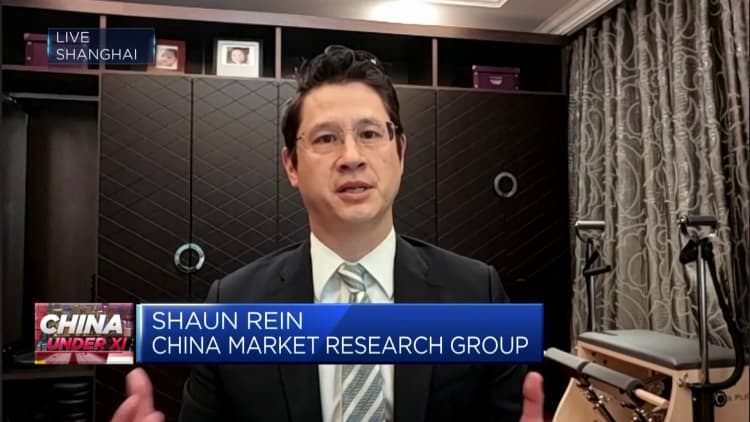[ad_1]
China has set a GDP goal of round 5% for one more 12 months, amid analyst issues of inadequate coverage assist to succeed in the objective.
Bloomberg | Bloomberg | Getty Photographs
Valuations of Chinese language shares are “means too low” and traders needs to be trying to cautiously re-enter the world’s second-largest financial system, in accordance with Shaun Rein, founder and managing director of the China Market Analysis Group.
China recorded its first month of inflation in February after 4 months of deflation, new figures confirmed, with the patron worth index climbing 0.7% year-on-year after a 0.8% annual decline in January.
Nonetheless, Rein attributed this to the Lunar New Yr interval, and insisted that deflation “nonetheless looms over the Chinese language financial system.”
“We’re nonetheless seeing although that Chinese language shoppers, particularly the rich ones, are fairly nervous â they’re nonetheless buying and selling down and skipping huge ticket objects,” Rein advised CNBC’s “Squawk Field Europe” on Monday.
“They’re cautious about whether or not or not the federal government goes to launch a bazooka-like stimulus â clearly they don’t seem to be going to.”
He urged that within the short-term, international luxurious manufacturers might proceed to wrestle with a scarcity of Chinese language demand, and that home neighborhood electrical automobile (NEV) producers may very well be in for a tricky run.

China’s well-documented financial struggles have led to broad declines in its inventory markets over the previous 12 months, as development was weighed down by a stoop in actual property and exports. The Chinese language authorities is concentrating on 5% development in 2024, having notched 5.2% in 2023.
“Admittedly, the NPC Work Report final week commits to conserving ‘cash provide and credit score development in keeping with the true GDP and inflation targets’, probably signalling policymakers will attempt a bit tougher to spice up inflation in direction of the three% goal in comparison with the earlier 12 months,” Zichun Huang, China economist at Capital Economics, stated in a analysis notice Monday.
“However we expect China’s low inflation is a symptom of its development mannequin constructed on a excessive charge of funding. As decreasing dependence on funding continues to be far off, we count on inflation to remain low in the long term.”
‘Too early to name a bull market’
Though the near-term headwinds imply the funding panorama stays difficult, Rein argued that measures taken to reconfigure the Chinese language financial system away from its conventional reliance on actual property and infrastructure had been beginning to have an effect, and the longer-term image is extra promising.
“China’s financial system is weak but it surely’s not that weak. If you happen to’re a multinational, should you’re trying to drive development over the following three to 5 years, the following China is China. It is not India â India’s solely a sixth of the GDP of China â it isn’t Vietnam. These are small markets, so I really assume traders needs to be wanting long-term at China once more, it is positively investible,” he stated.
“It is too early to name a bull market, you continue to must be very cautious, the financial system continues to be weak â do not get me improper â once more the D phrase (deflation) looms over China, there may be nonetheless a weak job market, however the valuations are too low.”
Regardless of a modest rebound within the final month, Hong Kong’s Grasp Seng index continues to be down greater than 14% over the previous 12 months, and Rein stated he had personally begun investing in Hong Kong-listed A-shares round a month in the past on the assumption that “valuations are means too low.”
[ad_2]


![The Finest Scene In Workplace House Was Virtually Ruined By The Studio [SXSW 2024]](https://flashbreakingnews.com/wp-content/uploads/2024/03/l-intro-1710184285-75x75.jpg)

